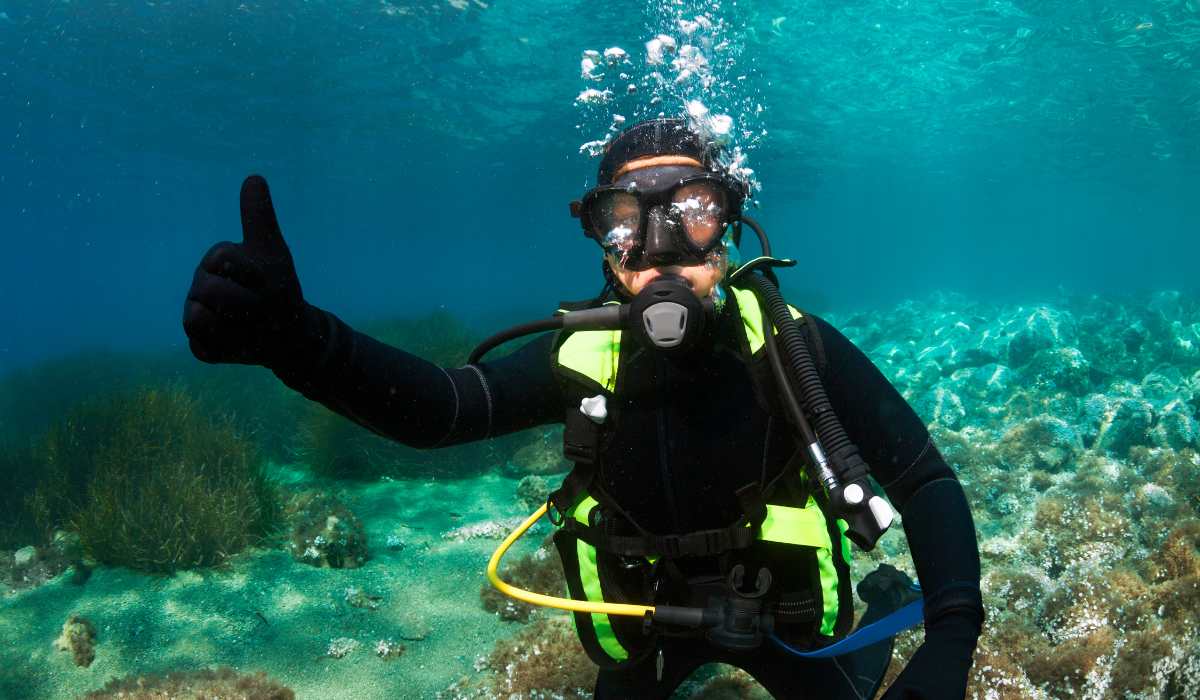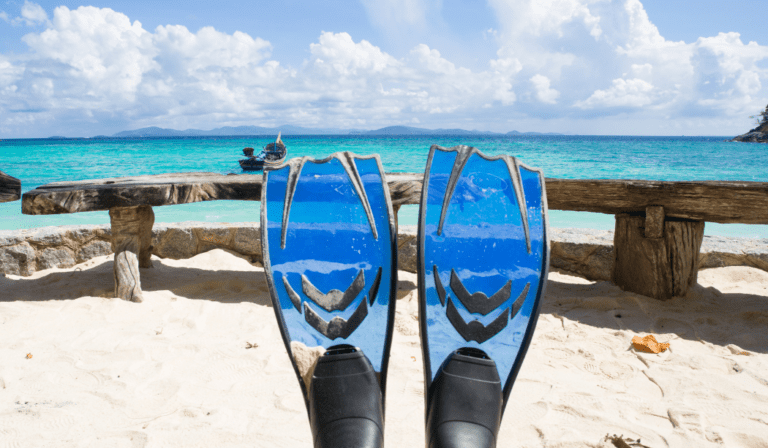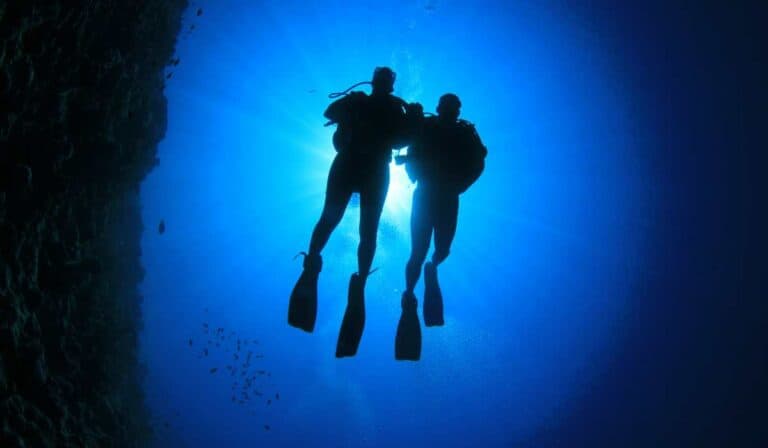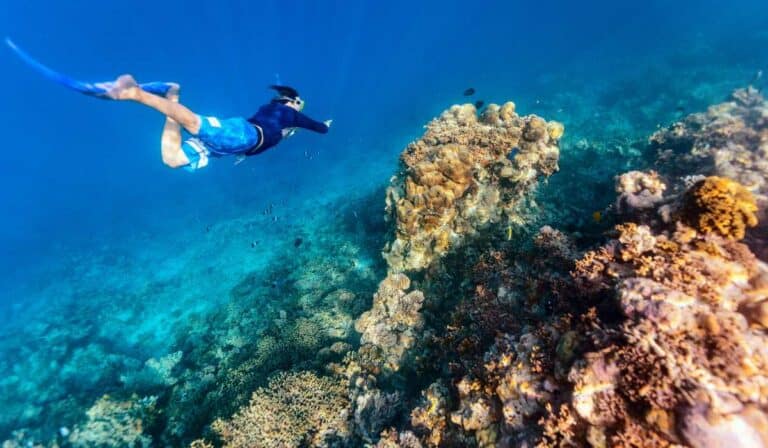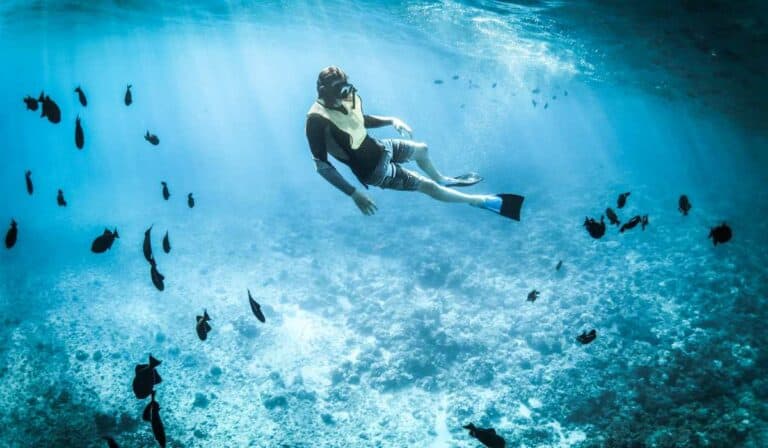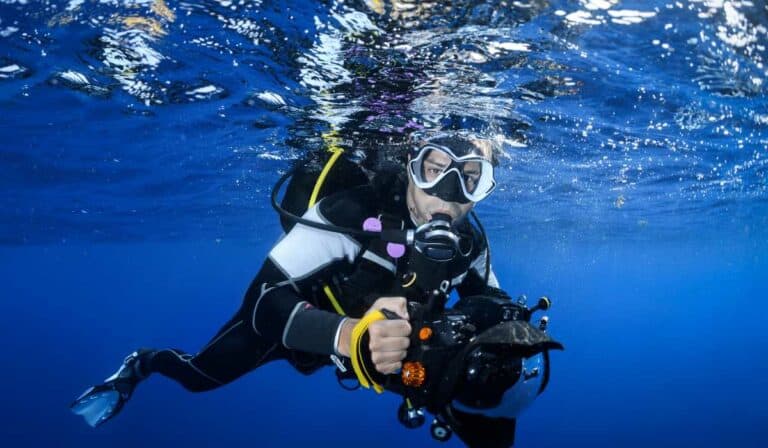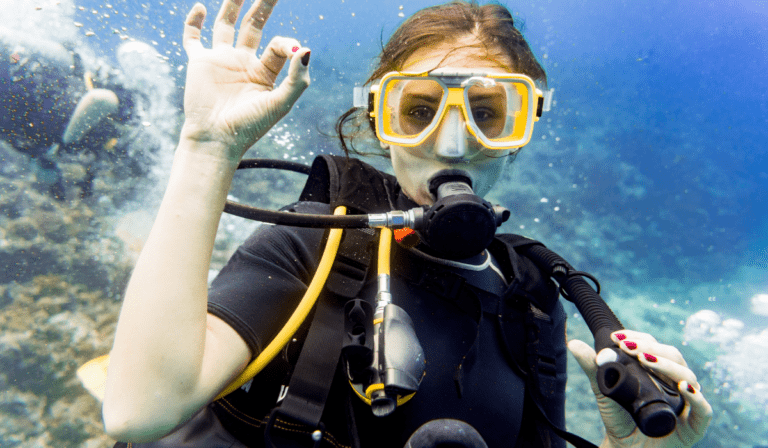Scuba Certifications and Depth Limits! A Guide
Scuba certifications and depth limits are essential factors to consider when planning your underwater adventures. By understanding the various certification levels and their corresponding maximum depths, you can safely explore the mesmerizing world beneath the waves.
In this comprehensive guide, we will dive into what scuba certification entails, the steps to getting certified, the costs associated with it, and how long a scuba certification lasts. Furthermore, we’ll discuss different types of scuba certifications available for recreational and technical divers alike.
To conclude, by understanding the requirements and safety protocols associated with scuba certification, you are now ready to embark on a memorable underwater adventure. With this knowledge in hand about scuba certifications and depth limits, you’re well-equipped to embark on an unforgettable diving journey while ensuring safety at all times.
Table of Contents
What is Scuba Certification?
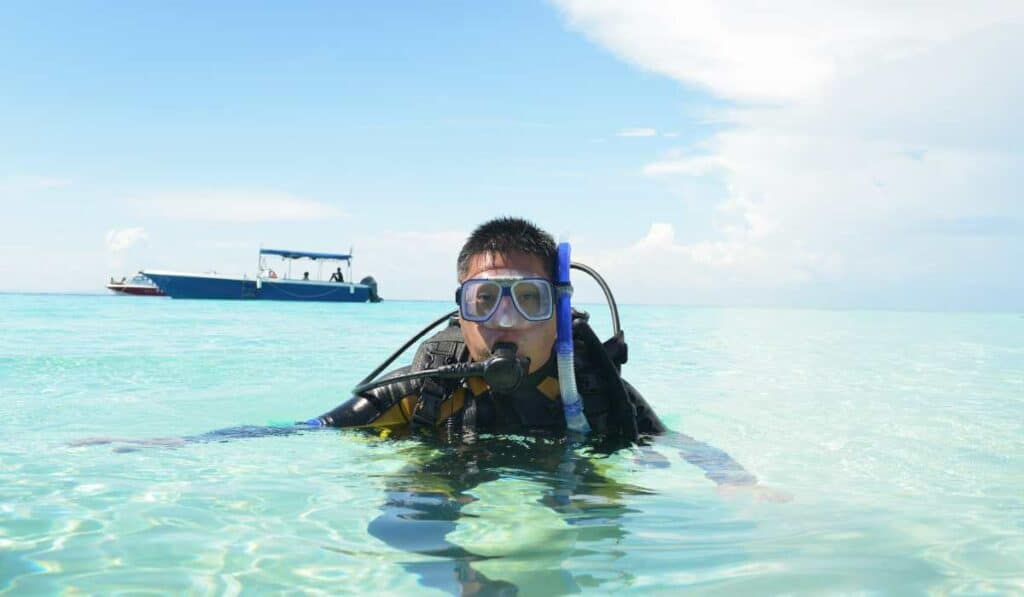
Gaining scuba accreditation allows divers to acquire the essential skills and understanding needed for securely delving into the deep sea. Becoming scuba certified not only ensures your safety but also helps protect marine life by teaching responsible diving practices.
The importance of being scuba-certified cannot be overstated. It’s essential for anyone who wants to dive into the depths of our planet’s oceans, lakes, and rivers while minimizing the risks associated with this thrilling activity. Diving without proper training can lead to accidents or injuries that could have been easily avoided if proper precautions were taken.
To obtain a scuba certification, divers must complete a series of courses offered by recognized organizations such as PADI, SSI, or NAUI. These organizations set global standards for recreational diving education and ensure that their instructors are well-trained in both diving techniques and safety procedures.
- PADI: Professional Association of Diving Instructors – The largest organization offering certifications worldwide.
- SSI: Scuba Schools International – Another major player in the industry providing comprehensive training programs.
- NAUI: National Association of Underwater Instructors – Known for its focus on environmental conservation and higher emphasis on technical aspects during training sessions.
No matter which organization you choose for your certification journey, rest assured that they all follow strict guidelines designed to provide safe experiences while fostering an appreciation for our aquatic ecosystems’ beauty and fragility. So why wait? Dive into the adventure today.
Understanding Depth Limits
Scuba diving is an exciting activity that allows you to explore the underwater world and experience the beauty of marine life. However, it’s essential to understand the maximum depth limits to dive safely and avoid potential risks associated with diving deeper.
Recreational diving is typically limited to a maximum depth of 130 feet (40 meters). This depth limit is set by scuba training agencies such as PADI, SSI, and NAUI to ensure the safety of recreational divers. Diving beyond this depth requires specialized training and equipment, such as technical diving or decompression diving.
It’s crucial to note that the maximum depth limit is not a recommendation but a safety requirement. Diving beyond this limit can lead to serious health risks, such as decompression sickness, nitrogen narcosis, and oxygen toxicity. These risks can be life-threatening and should not be taken lightly.
When diving, it’s essential to use a dive computer to monitor your depth and bottom time. A dive computer calculates the amount of nitrogen absorbed by your body and helps you avoid exceeding the maximum depth limit. Additionally, always dive with a buddy and follow the “buddy system” to ensure that you have someone to assist you in case of an emergency.
Steps to Getting Scuba Certified
Diving into the underwater world is an exhilarating experience, and getting scuba certified is your ticket to explore it safely and responsibly. To become a qualified diver, there are certain measures to take in order to gain the abilities, information, and trust needed for this amazing outdoor pursuit.
- Choose a certification agency: There are several reputable scuba diving certification agencies worldwide, such as PADI (Professional Association of Diving Instructors), SSI (Scuba Schools International), or NAUI (National Association of Underwater Instructors). Each organization has its training standards and course structure, but all provide internationally recognized certifications.
- Enroll in an Open Water Diver course: This entry-level course consists of three main components – academic learning, confined water dives, and open water dives. During the academic sessions, you’ll learn about dive theory, equipment usage, safety procedures, and basic dive planning through online materials or classroom instruction.
- Complete confined water dives: Confined water dives take place in swimming pools or shallow waters where you can stand up easily. These sessions allow you to practice essential scuba skills like buoyancy control, mask clearing, and regulator recovery under the guidance of your instructor before venturing into deeper waters.
- Fulfill open water dive requirements: Typically, four open water dives are required for completing your certification process. You’ll put everything learned during your training into practice while exploring local dive sites under the supervision of your instructor. This is where you’ll experience the true magic of scuba diving.
- Get certified: Once you’ve successfully completed all course requirements, your instructor will issue your certification card, which serves as proof that you’re a qualified Open Water Diver. Congratulations. You can now embark on countless underwater adventures worldwide.
Bear in mind that each diver’s learning pace and comfort level may vary; hence it’s essential to choose a reputable dive center with experienced instructors who prioritize safety and individual attention. Happy bubbles.
Completing the steps to getting scuba certified is an exciting journey and a great way to experience some of the most beautiful underwater scenes. Let’s now explore the expenditure involved in obtaining your scuba certification.
Key Takeaway:
To become a certified scuba diver, you need to choose a reputable certification agency like PADI or SSI and enroll in an Open Water Diver course. This entry-level course includes academic learning, confined water dives, and open water dives that will equip you with the necessary skills and knowledge to explore the underwater world safely.
Click here to read about How to Scuba Dive with Sharks: A Beginner’s Guide
Cost of Scuba Certification
The cost of getting scuba-certified can vary depending on several factors, such as the location and type of certification you choose. In general, the price range for a basic Open Water Diver course can be anywhere from $300 to $700. To give you a better understanding of what to expect in terms of expenses, let’s break down some common costs associated with scuba certification:
- Course fees: This is the primary expense when it comes to obtaining your scuba certification. The fee typically covers classroom sessions, pool training sessions, open water dives (usually four), and rental equipment during these activities.
- E-learning materials: Most dive centers require students to purchase their own e-learning materials or textbooks that cover essential diving theory and safety guidelines. These resources usually cost around $50-$100.
- Dive gear: While most courses include rental gear for use during training sessions, many divers prefer investing in their own personal equipment for comfort and hygiene reasons. Basic items like masks, snorkels, fins, wetsuits, or exposure suits may need to be purchased separately at an additional cost ranging from $200-$500+ depending on quality and brand preferences.
- Certification card processing fee: After successfully completing your course requirements and passing exams/tests/evaluations required by your chosen certifying agency (such as PADI or SSI), there will likely be a small fee ($20-$40) for processing your official certification card which serves as proof of completion.
In addition to these direct costs related specifically to obtaining your initial Open Water Diver certification level/course; ongoing maintenance expenses should also be considered if planning regular dive trips post-certification. These may include:
- Equipment maintenance and servicing: To ensure your gear remains in good working condition, regular servicing is essential. Annual maintenance expenses can vary from fifty to over a hundred dollars, depending on the gear.
- Dive insurance: While not mandatory, it’s highly recommended that divers invest in specialized dive insurance to cover potential risks associated with diving activities such as decompression sickness treatment or emergency evacuation costs. Annual premiums typically start around $75 for basic coverage levels.
Keep in mind that while scuba certification might seem like a significant upfront investment, the priceless experiences, and memories gained through exploring our planet’s underwater wonders make it well worth the cost. Plus, once certified at an entry-level (Open Water Diver), there are many opportunities to continue learning and advancing your skills by pursuing additional specialty courses or higher certification levels which can open up even more exciting diving adventures.
To find a reputable dive center near you offering affordable scuba certification options, consider checking out websites like PADI Dive Centers & Resorts Locator, or consult local diver communities/forums for recommendations based on personal experiences.
The cost of getting scuba-certified can differ, depending on the kind and duration of class taken; however, generally, it’s an economical way to become qualified. Moving forward, we will explore how long a scuba certification lasts before needing renewal.
Key Takeaway:
Scuba certification expenses can range from three hundred to seven hundred dollars, varying depending on locale and the kind of credential. This includes course fees, e-learning materials, dive gear, and a certification card processing fee. Ongoing maintenance expenses like equipment servicing and dive insurance should also be considered for regular diving trips post-certification.
Click here to read about World’s Best Quarries for Scuba Diving
How Long Does Scuba Certification Last?
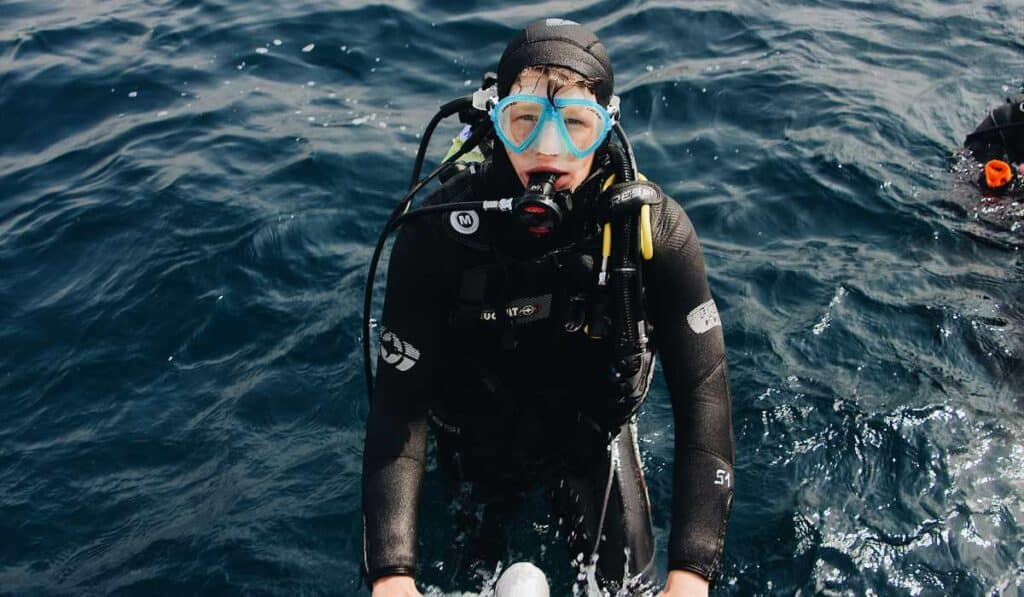
Most certifications do not have an expiration date, so you can keep your scuba certification for life after completing the necessary training. Once you’ve successfully completed the required courses and earned your certification, it is valid for life. However, there are some important factors to consider when it comes to maintaining your skills and staying safe underwater.
Maintaining Your Skills
While your scuba certification itself doesn’t expire, it’s essential to keep up with regular diving practice in order to maintain and improve your skills. If you haven’t been diving for a while or feel rusty on certain techniques, many dive centers offer refresher courses designed specifically for this purpose. These courses help ensure that you’re comfortable with all aspects of diving before heading back into the water.
- Dive regularly: Try to go diving at least once every six months or yearly if possible – this helps keep your skills sharp and ensures that you stay familiar with equipment setup and safety procedures.
- Continue learning: Consider taking additional specialty courses or advanced certifications (more on these below) in order to expand your knowledge base and become a more proficient diver.
- Buddy check: Always perform thorough buddy checks before each dive – even if you’re an experienced diver – as this can help catch any potential issues early on.
Certification Renewals & Advanced Certifications
In some cases, specific types of scuba certifications may require periodic renewal or continuing education credits. For example, professional-level certifications such as Divemaster or Instructor often need to be renewed annually, and they may require proof of ongoing dive experience or additional training.
If you’re interested in exploring deeper depths or more challenging environments, you’ll likely need to pursue advanced certifications. These courses build upon your foundational scuba skills and prepare you for diving in different conditions. Some examples include:
- Advanced Open Water Diver – Allows divers to explore depths up to 100 feet (30 meters).
- Deep Diver – Trains divers for safe exploration down to 130 feet (40 meters).
- Enriched Air Nitrox – Teaches divers how to use enriched air mixtures with higher oxygen content, allowing for longer bottom times at certain depths.
In summary, while most scuba certifications don’t expire, it’s crucial that you maintain your skills through regular practice and consider pursuing advanced certifications if needed. By doing so, you’ll ensure a safer and more enjoyable diving experience.
Certifying in scuba is an excellent way to experience the underwater world, but keep in mind that certifications have a shelf life. Moving forward, we will examine the various scuba certifications available and how they can ensure a safe diving experience.
Key Takeaway:
Scuba certifications typically do not have an expiration date, but it’s important to maintain your skills through regular diving practice and consider pursuing advanced certifications if you want to explore deeper depths or more challenging environments. Dive centers offer refresher courses for rusty divers, and professional-level certifications may require periodic renewal or continuing education credits.
Click here to read about The Magic of Scuba Diving – A Beginner’s Guide
Different Types of Scuba Certifications
Diving into the realm of scuba can be a thrilling and beneficial journey, but it is essential to understand the different certifications available for various depths and forms of diving. Each certification level offers unique opportunities to explore underwater environments while ensuring your safety and skill development.
Open Water Diver Certification
The Open Water Diver Certification is typically the first step in becoming a certified scuba diver. This entry-level certification allows you to dive up to 60 feet (18 meters) deep with a buddy or under professional supervision. The course covers basic skills such as equipment setup, buoyancy control, navigation, and emergency procedures.
Advanced Open Water Diver Certification
The Advanced Open Water Diver Certification builds on the skills learned during your open water training by introducing more advanced techniques like drift diving, night diving, deep diving (up to 100 feet / 30 meters), and underwater photography. This certification opens up new possibilities for exploration while refining your existing abilities.
Rescue Diver Certification
A Rescue Diver Certification focuses on developing problem-solving skills needed in emergencies both above and below water surfaces. You’ll learn how to manage stress in yourself and others while mastering rescue scenarios involving panicked divers or unconscious victims at depth.
List of Specialty Courses:
- Nitrox Course:
This course teaches you how to use enriched air nitrox, which allows for longer bottom times and shorter surface intervals. Learn more about the Nitrox Course. - Deep Diver:
The Deep Diver certification enables you to dive up to 130 feet (40 meters) deep while exploring wrecks, caves, or other unique underwater features. Check out the Deep Diver course. - Wreck Diving:
This specialty focuses on safely navigating and penetrating shipwrecks while preserving their historical value. Discover more about the Wreck Diving course.
Dive Master Certification
For those with a passion for diving and an ambition to reach the highest level of proficiency, Dive Master Certification offers the skills necessary to lead recreational dives or assist instructors in teaching sessions. The Dive Master Certification equips you with the leadership abilities needed to guide divers on recreational dives or assist instructors during training sessions.
In summary, there are various types of scuba certifications available depending on your interests and goals as a diver. From entry-level courses like Open Water Diver Certification to advanced specialties such as Wreck or Deep diving – each certification offers unique opportunities for exploration and skill development. It’s important to remember to always dive safely, follow maximum depth limits, and use proper scuba equipment. Additionally, it’s recommended to dive with a buddy and use a dive computer to monitor your dive and avoid decompression diving. With the right training and experience, scuba diving can be a thrilling and unforgettable adventure.
Completing a scuba certification course provides divers with the knowledge and skills to safely explore underwater environments. Let’s now consider the advantages of having a scuba certification.
Key Takeaway:
The article discusses different types of scuba certifications and their depth limits. From the entry-level Open Water Diver Certification to advanced specialties like Wreck or Deep diving, each certification offers unique opportunities for exploration and skill development while ensuring safety measures are followed. It’s important to always dive safely, follow maximum depth limits, use proper equipment, and dive with a buddy.
Benefits of Being Scuba Certified
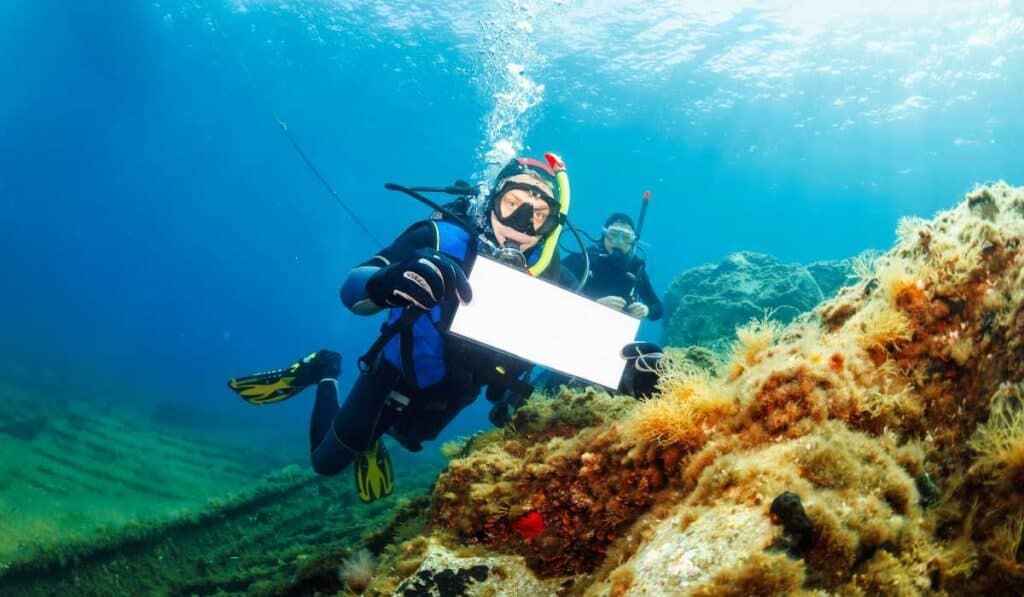
There are numerous benefits to becoming scuba certified, which can enhance your underwater adventures and open up a whole new world of exploration. Here are some key advantages:
- Safety: Scuba certification ensures that you have the necessary skills and knowledge to dive safely. This includes understanding how to use your equipment properly, managing air consumption, navigating underwater environments, and dealing with potential emergencies.
- Access to Deeper Dives: As an Open Water Diver (the most basic level of certification), you’ll be limited to diving depths of around 60 feet (18 meters). However, by obtaining additional certifications such as Advanced Open Water or Deep Diver specialty courses (PADI, for example), you can explore deeper waters – sometimes up to 130 feet (40 meters) or more.
- Night & Wreck Diving Opportunities: With further training in specialized areas like night diving or wreck diving, you’ll gain access to unique experiences that only certified divers can enjoy. Imagine exploring a sunken shipwreck at night while bioluminescent creatures light up the water around you. Check out these exciting specialty courses offered by organizations like SDI.
- Easier Dive Planning & Travel: Many dive shops and resorts require proof of certification before allowing customers on their boats or renting gear. Having a valid scuba certification card makes it much easier for you when planning dives both locally and internationally.
- Better Conservation Awareness: Scuba certification courses teach divers about the importance of marine conservation and how to minimize their impact on underwater ecosystems. This knowledge helps you become a more responsible diver, contributing positively to the preservation of our oceans.
- Joining a Community: Becoming scuba certified means joining an international community of passionate divers who share your love for exploring the underwater world. You’ll have opportunities to meet new friends, join local dive clubs, and participate in group trips or events organized by diving organizations such as SSI.
In short, obtaining your scuba certification unlocks countless possibilities for adventure and discovery beneath the waves. It’s an investment in yourself that will pay off with incredible experiences and memories that last a lifetime.
Certification in scuba diving can unlock a plethora of thrilling opportunities, from delving into the depths of our seas to unearthing concealed aquatic treasures. Now that you know some of the benefits, it’s time to start preparing for your first dive.
Key Takeaway:
Becoming scuba certified has numerous benefits, including enhanced safety skills, access to deeper dives, and specialized experiences like night or wreck diving. It also makes dive planning and travels easier, increase conservation awareness, and provides opportunities to join a passionate international community of divers.
Click here to read about Jamaica Scuba Diving Guide: Dive into the Best Underwater World
Preparing for Your First Dive
Here are some tips on how to get ready for your first dive after obtaining your scuba certification:
Familiarize Yourself with Your Gear
Before you go diving, familiarize yourself with the proper use and assembly of your scuba gear. This includes understanding how each piece works and fits together, as well as practicing putting it on and taking it off both in and out of the water.
- Mask: Ensure that your mask fits comfortably without leaking or fogging up.
- Fins: Choose fins that fit snugly yet comfortably around your feet.
- Buoyancy Control Device (BCD): Adjust straps so that they fit securely while allowing freedom of movement.
- Tank & Regulator: Check connections between the tank valve and regulator for proper function.
- Weights & Weight Belt: Practice adjusting weights to achieve neutral buoyancy at different depths during a dive.
Review Safety Procedures
Prior to any dive, it is essential that safety protocols are reviewed and understood. Refresh yourself on important safety procedures such as buddy checks, hand signals, emergency ascents, decompression stops, and more by referring back to materials from your scuba certification course or consulting reputable online resources like those provided by PADI.
Plan Your Dive and Dive Your Plan
Before entering the water, discuss your dive plan with your buddy or dive group. This should include details such as:
- Dive site location and conditions (currents, visibility, etc.)
- Maximum depth and bottom time limits
- Entry/exit points and navigation plans underwater
- Potential hazards or points of interest to be aware of during the dive
- Emergency procedures in case of separation or other issues while diving.
Once you’ve established a solid plan, stick to it throughout your dive for maximum safety and enjoyment.
Stay Within Your Limits & Skill Level
Your scuba certification has prepared you for specific depths and types of dives based on your training level. Be aware that going beyond your permitted depths and activities can be hazardous for both you and other divers. If you’re interested in exploring deeper waters or more advanced types of diving like wreck diving or cave diving, consider pursuing additional certifications that will equip you with the necessary skills.
In conclusion, scuba diving is an exciting and rewarding activity that requires proper preparation and caution. By familiarizing yourself with your gear, reviewing safety procedures, planning your dive, and staying within your limits and skill level, you can dive safely and enjoyably. Remember to always dive with a buddy, use a dive computer, and follow the maximum depth limits set by your scuba training agency to avoid the dangers of diving deeper than your training allows.
Key Takeaway:
To prepare for your first dive after obtaining a scuba certification, it is important to familiarize yourself with your gear and review safety procedures. Plan your dive with your buddy or group, stay within your limits and skill level, and always follow maximum depth limits to ensure a safe and enjoyable experience.
FAQs about Scuba Certifications and Depth Limits
HOW DEEP CAN YOU GO WITH SCUBA CERTIFICATION?
With an Open Water Scuba Certification, divers are limited to a maximum depth of 60 feet (18 meters). However, obtaining an Advanced Open Water or Deep Diver Specialty Certification allows divers to reach depths up to 130 feet (40 meters) and beyond. The specific depth limit depends on the level of training and experience.
What Are the Maximum Depth Limits for Scuba Training Agencies?
Scuba training agencies like the Professional Association of Diving Instructors (PADI) and Scuba Schools International (SSI) set different depth limits based on certification levels. For recreational diving, the absolute maximum limit is 130 feet (40 meters), which requires at least an Advanced Open Water or Deep Diver Specialty Certification.
How Deep Can You Scuba Dive Without Certification?
Diving without proper certification is highly discouraged due to safety concerns. However, beginners participating in supervised introductory dives like Discover Scuba Diving may dive up to a shallow depth of around 30-40 feet (9-12 meters). It’s crucial that uncertified individuals only dive under professional supervision.
What Is the “120 Rule” in Scuba Diving?
The “120 Rule” refers to a guideline used by some divers for calculating their no-decompression limits during repetitive dives. By subtracting your planned dive’s deepest point from 120, you obtain your allowed bottom time in minutes. This rule should not replace formal decompression training but serves as a general reference for experienced divers.
Conclusion
Getting certified involves taking classes, passing tests, and practicing skills in the water. The cost of obtaining a scuba certification can vary, depending on the kind you select. However, being scuba certified has numerous benefits such as exploring new depths and marine life while having fun.
Before your first dive, it’s essential to prepare by checking equipment and knowing your limits based on your certification level.

